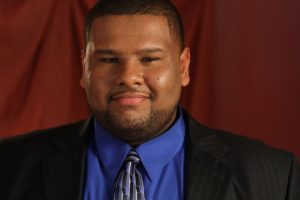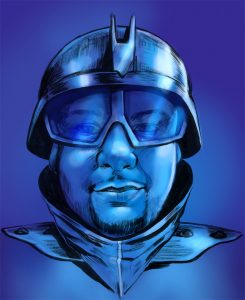

Now in its 12th season, Downtown Urban Theater Festival is presenting work from 17 emerging playwrights blending dance, theater, visual arts and music in its live performances.
First on the line-up is "Toy Soldierz". Written and directed by Javier Reyes from San Francisco, this multimedia performance was created in response to a student Reyes lost. We spoke with Reyes about his rehearsal process, incorporating dance and video in his work, and the importance of mentorship.
SB: Characters Antony and Devon are best friends who grew up together, but their relationship becomes strained. Does their relationship speak to a larger concern about community?
JR: Yes it does. We need to give our youth better communication and conflict resolution skills in order not to have so disputes ending up deadly.
SB: How can one prevent more incidents of 'toy soldierz' in the world?
JR: Invest in people. Mentorship is so important in these times. Many people can’t see the other side of fence because no one has walked them over and showed them the other side. It’s good for folks to be “soldierz,” but the biggest question we have to help people understand is “what are you fighting for” and “what are you fighting against?” And then ask them how can I be your ally to win the battle.
SB: What was the rehearsal and tech process like, including the videography?
JR: Very grueling. I required my cast to come clean with something they were healing from and someone that are struggling to forgive. I forced them to heal and pray during the rehearsal process more than I asked to remember their lines. I didn’t want them to be hypocrites and preach one thing, but not living it. Aside from that, we spent hundreds of hours choosing the right music, filming scenes that connected the best to the story line. It's like we created a full independent film while producing a full length play and squashed it down to 75 minutes.
 StageBuddy: What was the process like incorporating dance and video into this production?
StageBuddy: What was the process like incorporating dance and video into this production?
Javier Reyes: We have been workshopping “Toy Soldierz” off and on since 2004, when the name was originally “What If the Streets Could Speak?” The production continued to evolve and the vision continued to grow in terms of possibilities. Over the years, we would add different artistic elements to the show based on the artists we cast, such as live music, singing or live painting. Dance came into the fold around 2009, when I decided to show the main character’s spirit through dance and he struggled to forgive. We incorporated “B-Boy”, ballet, Afro-Haitian, West African and hip-hop to show all of the range of emotions Devon was feeling. In terms of film, one of my actors told me in 2007 that this production was more than a play; it’s a movie. I was advised not to mix film and theater together due to them not blending well. But then I thought, “how could we have the best of both worlds in our production?” I decided that the film portion of “Toy Soldierz” would show the backstory of the conflict while on stage having Devon on stage in a coma state sorting everything out.
SB: You use dance as a vehicle of forward momentum in this play; how did you choose certain songs?
JR: I think personally the songs choose me. Like they literally said “put me here to help emphasize the emotion and moment of a scene.” Certain songs brought out an emotional response from me that helped me to visualize the story better. So I knew it would do the same for the audience. My musical style is eclectic, even though I grow up as a hip-hop kid. So “Toy Soldierz” has a mix hip-hop, rock, alternative, R&B, and jazz that could tell this story even if the actors didn’t have any lines.
SB: How do you expect New York audiences to respond to this production?
JR: I expect the NYC audience to respond the same way they did two years ago when we did an earlier version of the play at the Nuyorican Poets Café. Pain is universal whether you are from the East Coast or the West Coast. This production forces the audience to do a diagnosis check of their soul for compassion, love and empathy. We encourage the audience to let go of past pains, heal and release others from the bad they’ve caused them through the modeled behavior of the characters on stage. We want the audience to identify with the characters on stage and to see themselves where they have been in grieving and to see the other side of it. To know in the end that God heals all wounds.
SB: If you set this play twenty years in the future, would circumstances change? If so... How? If not... Why?
JR: I pray the circumstances do change. I hope prayer is back in schools and that the arts are funded more in America than in any other country in the world. I hope teachers make as much as correctional officers and people in the African American community will put their money together to distribute films and music that have more of a positive impact on our youth. I hope public schools offer an equal opportunity for kids to succeed as private schools do. That restorative justice practice is implanted in every school. If these things and others don’t change, we still will be in the same place, if not worse. Society is breeding killers, social junkies and inmates due to the lack of financial investing into social programs that work to boost conscious thinking, morality and spiritual awareness. And this will continue if society doesn’t demand more.
SB: Reason to see this play in 120 characters or less?
JR:If audience members need healing and need to see what forgiveness looks like, then this play is for you.
Check out the trailer for "Toy Soldierz":
The Downtown Urban Theater Festival runs Apr 2-19 at HERE.